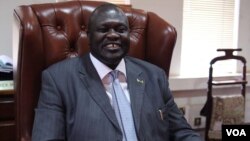JUBA, SOUTH SUDAN —
South Sudan's Vice President Riek Machar met this week with civil society groups to discuss a national reconciliation project, aimed at healing the wounds left by years of war and unrest in South Sudanese communities.
“The war has created barriers among our people... The war has created trauma to all of us," said Machar, who has been at the forefront of reconciliation efforts in South Sudan.
He urged the South Sudanese to look to the future instead of dwelling on past grievances.
"What has happened in the past... let’s leave in the past. War should not be continued in our minds because many people are still fighting in their minds. We will not build a strong state unless we overcome this,” he said.
The reconciliation campaign, titled “A Journey of Healing for National Reconciliation”, is due to launch in April and would follow the model of the Truth and Reconciliation Commission in South Africa, where victims and perpetrators of apartheid-era injustices met and reconciled.
South Sudan's healing and reconciliation campaign was approved last month by the Council of Ministers.
Machar, who last year apologized for his pivotal role in the massacre of hundreds of civilians in Jonglei state in 1991, some eight years into the civil war in Sudan, heads a committee in charge of preparing for the launch of the reconciliation effort.
But during meetings this week, civil society leaders questioned Machar's motives for leading the reconciliation effort and voiced skepticism about the government-led effort to heal South Sudan's wounds.
Steve Goi Gatluak of the community-based organization Dark Organization for Recovery and Development questioned the vice president’s motives for championing reconciliation.
“Could it be because, perhaps, you are intending at some time to lead this country? Are you doing it out of the quest for leadership of this country or are you doing it for the betterment of this nation?” he asked Machar.
Sarah Ajith Awel James, who chairs the South Sudan Women General Association, said many South Sudanese, and women in particular, are weary of the violence that continues to roil parts of South Sudan, eight years after the signing of the Comprehensive Peace Agreement, which ended Sudan's long civil war.
"People are bitter, people are frustrated. Even some of them are asking: 'Why did we vote for independence? It would be better for us to remain as one country,'” she said.
More than eight million South Sudanese Pounds have been earmarked for the reconciliation project, and some 200 youths are expected to be trained to mobilize communities and get them to take part in the process, which is due to be formally launched in April by President Salva Kiir.
“The war has created barriers among our people... The war has created trauma to all of us," said Machar, who has been at the forefront of reconciliation efforts in South Sudan.
He urged the South Sudanese to look to the future instead of dwelling on past grievances.
"What has happened in the past... let’s leave in the past. War should not be continued in our minds because many people are still fighting in their minds. We will not build a strong state unless we overcome this,” he said.
The reconciliation campaign, titled “A Journey of Healing for National Reconciliation”, is due to launch in April and would follow the model of the Truth and Reconciliation Commission in South Africa, where victims and perpetrators of apartheid-era injustices met and reconciled.
South Sudan's healing and reconciliation campaign was approved last month by the Council of Ministers.
Machar, who last year apologized for his pivotal role in the massacre of hundreds of civilians in Jonglei state in 1991, some eight years into the civil war in Sudan, heads a committee in charge of preparing for the launch of the reconciliation effort.
But during meetings this week, civil society leaders questioned Machar's motives for leading the reconciliation effort and voiced skepticism about the government-led effort to heal South Sudan's wounds.
Steve Goi Gatluak of the community-based organization Dark Organization for Recovery and Development questioned the vice president’s motives for championing reconciliation.
“Could it be because, perhaps, you are intending at some time to lead this country? Are you doing it out of the quest for leadership of this country or are you doing it for the betterment of this nation?” he asked Machar.
Sarah Ajith Awel James, who chairs the South Sudan Women General Association, said many South Sudanese, and women in particular, are weary of the violence that continues to roil parts of South Sudan, eight years after the signing of the Comprehensive Peace Agreement, which ended Sudan's long civil war.
"People are bitter, people are frustrated. Even some of them are asking: 'Why did we vote for independence? It would be better for us to remain as one country,'” she said.
More than eight million South Sudanese Pounds have been earmarked for the reconciliation project, and some 200 youths are expected to be trained to mobilize communities and get them to take part in the process, which is due to be formally launched in April by President Salva Kiir.





